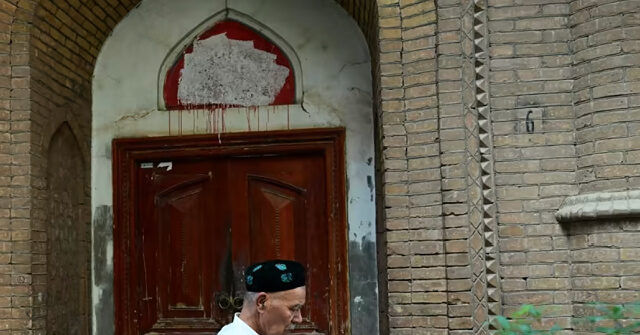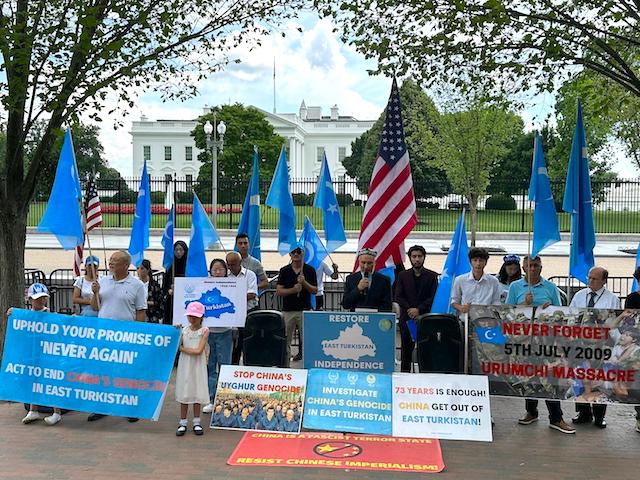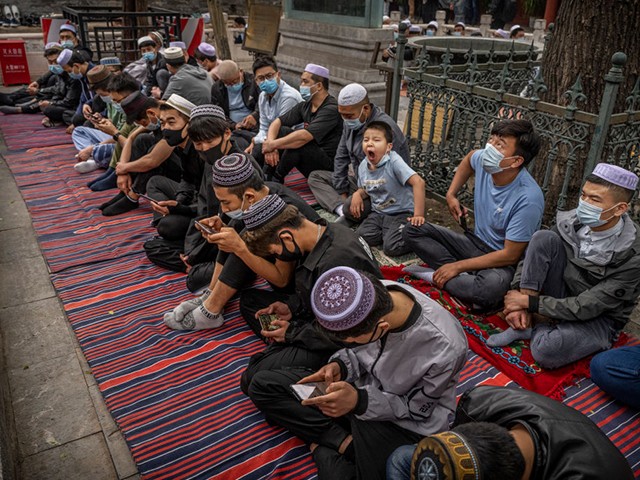Top News
Report: China Goes on Bulldozing Spree Against Mosques in Muslim Areas

Human Rights Watch (HRW) published a report on Wednesday that said China is shuttering mosques in Ningxia and Gansu provinces under a “mosque consolidation” policy that violates the religious freedom of Muslim residents.
“The Chinese government is not ‘consolidating’ mosques as it claims, but closing many down in violation of religious freedom,” said HRW’s acting director for China, Maya Wang.
“The Chinese government’s closure, destruction, and repurposing of mosques is part of a systematic effort to curb the practice of Islam in China,” Wang said.
This photo taken on June 4, 2019, shows the Chinese flag flying over the Juma mosque in the restored old city area of Kashgar, in China’s western Xinjiang region. (GREG BAKER/AFP/Getty Images)
Chinese dictator Xi Jinping’s campaign to “Sinicize” religions — in other words, make their teachings subordinate to Chinese Communist Party dogma and ensure his subjects can only worship at state-controlled facilities — includes a plan for “mosque consolidation” that was rolled out in 2018.
The regime in Beijing never really pretended “mosque consolidation” was anything but an effort to reduce the number of mosques, particularly in the Muslim-heavy provinces of Ningxia and Gansu. Government documents bluntly stated that construction of new mosques should be halted to “compress the overall number” of spaces for Islamic worship.
“There should be more demolitions than constructions,” the 2018 Chinese Communist Party document outlining the “mosque consolidation” strategy stated.
That strategy has been implemented vigorously over the past five years. Once new construction was halted, the Chinese government busied itself with demolition.
The other notable Muslim population in China, the Uyghur Muslims of what Beijing calls Xinjiang province, were aggressively destroyed with a vigor the less controversial Muslims of Ningxia and Gansu thought they would avoid. HRW cited studies that found two-thirds of the mosques in Xinjiang have been damaged or destroyed, with almost half of them completely demolished.
In the days before the Wuhan coronavirus pandemic, the more compliant Hui Muslims in the other provinces told themselves it could never happen to them – but it did. HRW studied satellite images that showed almost half of the mosques in some Ningxia towns have been physically damaged or destroyed. Other structures appear to be intact but are no longer used as mosques. Some studies estimate that a third of Ningxia’s mosques are now out of commission.
The Hui Muslims have protested less than the Uyghurs, possibly because they fear a similar fate of concentration camps and genocide, but some complaints from Gansu and Ningxia are beginning to reach the outside world. Some modest protests have been held in China, but they are quickly dispersed by security forces.

Uyghurs protest in front of the White House to mark the anniversary of the Urumqi massacre by China on July 5, 2023. (Courtesy East Turkistan National Awakening Movement)
HRW researchers and other religious freedom advocates told the UK Guardian on Tuesday that a common Chinese tactic is to contrive some reason to “renovate” mosques, perhaps because they allegedly fail to meet local building standards.
The alterations make the mosque less appealing to local Muslims — almost invariably beginning by knocking down its distinctive minarets — and soon progress to demolishing indispensable religious elements, such as the ablution hall, where worshipers ritually wash themselves before prayers. Once the ablution hall has been damaged, the mosque “has effectively been removed as a place of worship,” according to University of Plymouth lecturer Hannah Theaker.
An imam in Ningxia said China is methodically eliminating mosques until there is no more than one house of worship per five square kilometers, which is not enough to meet the needs of heavily Muslim urban populations.
“When mosques are closed, many young and middle-aged people will no longer go to mosques to participate in religious activities, and the next generation will slowly lose faith and have no confidence in Islam,” the imam said.
Hui Muslim activist Ma Ju said once attendance declines as the Ningxia imam described, the next step is for Chinese Communist officials to declare the mosque is no longer necessary, and another house of worship is shut down.
“After the mosques are ‘converted,’ the local governments strictly monitor attendance at the remaining mosques,” Ma Ju said, describing elaborate surveillance systems installed to monitor religious services.
HRW noted the content of those closely watched services includes an increasing amount of Chinese Communist Party propaganda. In July 2023, China imposed a law requiring all religious venues to “indoctrinate followers in CCP ideology” and break all ties with “foreign” influences. Mosques seen as having close links to overseas influences are highly likely to be found in violation of zoning laws and demolished.
“It’s all part of a systematic effort to curb the practice of Islam in China. What we’ve seen in Xinjiang is really ground zero for that, the most extreme end, but now we’re seeing some of the practices and policies applied there play out in other provinces,” HRW Asia Director Elaine Pearson told Canada’s Globe and Mail.
China’s relentless crusade to diminish and subjugate Islam is notable in the context of Beijing’s efforts to curry favor with Muslim leaders and become more of a power in the Middle East.

Hui Muslim men gather during Eid al-Fitr prayers at the historic Niujie Mosque on May 13, 2021, in Beijing, China. (Kevin Frayer/Getty Images)
China hosted the foreign ministers of Saudi Arabia, Egypt, and Jordan for a pro-Hamas “dialogue” this week, for example, but none of the visiting Muslim ministers seemed troubled that their Chinese hosts are bulldozing mosques and forcing Muslims to value Xi Jinping’s political writings more highly than the Quran.
China often brags about how many Muslim nations have endorsed its campaign of religious repression and genocide against the Uyghurs. Even Middle Eastern leaders who aspire to be regional kingpins or champions for all of Islam, like Turkish President Recep Tayyip Erdogan, have little to say about the abuse of the Uyghurs — a Turkic people — or Beijing’s campaign of “mosque consolidation.” China’s money evidently speaks louder than concentration camp victims, or imams sadly watching as their mosques are demolished.
Read the full article here


















